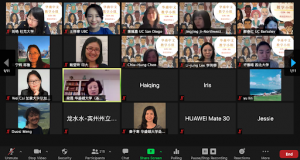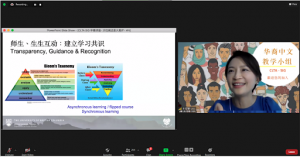
There could be a hundred different classes for a hundred heritage students, because each and every one of these students have specific learning needs and goals. Heritage students are those raised in a Mandarin-speaking environment and are bilingual to some extent. They present unique learning trajectories that do not fit into the traditional streams of new language learners; nor do they fall under the category of native speakers. With the hope of enhancing Chinese heritage language learning for heritage students across North America and beyond, the new Social Interest Group, Chinese Heritage Language Learning, associated with the Chinese Language Teachers Association (CLTA) was initiated and established by a team of passionate and professional Chinese language educators in Canada and the U.S. Two of our faculty members of the UBC Chinese Language Program are key founders and members of this developing international team.
“Before, Chinese heritage students’ language learning and pedagogy were rarely the centre of discussion in language education, but we are so proud of having heritage-stream courses at UBC that put heritage students’ learning in the front. Based on the foundation established by Dr. Duanduan Li, developed by Dr. Qian Wang and supported by the Department of Asian Studies, we want to work with other Chinese language educators to drive the growth of heritage language teaching and learning to keep it moving forward together. I think this is meaningful, particularly at this time when EDI (Equity, Diversity and Inclusion) issues are discussed and focused. We want to show how unique and also diverse Chinese heritage students are, and focus on what they need and want in learning.”
The CLTA SIG is newly built and devoted to promoting and enhancing heritage language teaching and learning. Composed of a team of passionate Chinese heritage language instructors from all over North America and beyond, the CLTA SIG strives to establish a cross-national support system, build a resource repository for instructors of heritage language classes, and most importantly, enhance the learning experience and educational progress of heritage students. To better understand the importance, challenges, opportunities, and potential improvements of heritage Chinese language teaching and learning, the CLTA SIG hosts pedagogical workshops and events covering a diverse range of topics to encourage interactions and discussions between instructors.

 |
 |
In light of the Asian Heritage month, the CLTA SIG hosted their first virtual panel dialogue on the evening of May 8th, 2021 to promote and raise awareness for Chinese heritage language teaching and learning. Six esteemed guest panellists from prestigious North American universities were invited to facilitate an international dialogue with over 200 dedicated Chinese language instructors from across the globe, including North America, Asia, Europe, etc. As the first of many events, the May 8th event was a huge success in bringing more attention to Chinese heritage language education. The CLTA SIG’s continued effort to organize informative events is a testament to their dedication to improving all aspects of Chinese heritage language education. The fifth event will be a virtual workshop to be held on August 12, where the reputable Dr. Xinshu She is invited to help Chinese heritage language instructors better understand important mental health issues among their students.

The fifth CLTA SIG event covering mental health topics of Chinese heritage language students
Among the SIG’s diverse and creditable board of team members are UBC Chinese Language Program’s (CLP) very own Dr. Hsiang-ning Sunnie Wang and instructor Li-Jung Lee. These professors not only represent the voice of UBC CLP’s Chinese heritage language program within the SIG, but more significantly, they are able to share and demonstrate UBC CLP’s leadership role in the field of Chinese heritage language education.
“In light of Asian Heritage Month, I hope people see the strength of the heritage language program. Many Heritage professors teach their students to ‘take social action’ so this is the professors’ way of setting an example for their students to take social action. All professors who are interested in heritage teaching can come together on this platform to exchange educational resources, discuss critical professional topics, and share pedagogical ideas as well as their first-hand experience.”
The UBC CLP is a leader among North American university programs for recognizing early on the diverse learning needs of heritage Mandarin students and pioneering a specialized course stream dedicated to them. Thanks to the CLP’s constant dedication in enhancing its heritage courses, Chinese heritage language learning at UBC has transformed over the years and is set on a path of flourishment. For instance, the Chinese heritage language classes have witnessed significant growth over the years through the long-term efforts of the CLP Director Dr. Wang Qian, previous program director Dr. Duanduan Li, and language program coordinator Dr. Hsiang-ning Sunnie Wang. All the hard work and commitment of these professors and their team, including Li-jung Lee, Chien-Ju Lin, Sheni Chen and Mingzhu Lu, have resulted in a significant increase (more than 35%) in heritage Chinese course enrollment in the past years, welcoming nearly 500 Chinese heritage language students last year!

Li-jung Lee, a visiting lecturer of the Chinese Language Program and the IT specialist for the CLTA SIG
“It is crucial for educators to dialogue more, so we are able to appreciate the characteristics of heritage language learners, effectively respond to learner’s needs at different levels, and further continue to develop learner-centered curricula through monthly discussions and workshops in which professional and passionate educators are from all over the world.”
As heritage language instructors, Dr. Hsiang-ning Wang and Li-Jung Lee identified a major challenge, but also an opportunity in their classrooms, namely, every heritage student has different learning needs. For instance, it can be challenging to accommodate the needs of a Cantonese speaker who wants to practice speaking Mandarin, while catering to Mandarin speakers seeking to improve their reading proficiency at the same time. However, through the collective efforts of the Chinese heritage teaching team, the UBC CLP’s newly revised heritage teaching strategies focus on helping individual students set personal learning goals, adjusting their misconceptions from previous Mandarin learning experiences, rebuilding their connection to their Chinese heritage and backgrounds, and above all, creating positive learning experience throughout their UBC Chinese language learning journey. These challenges were also echoed and these endeavors of differentiating and collaborative learning were supported by other members of the CLTA SIG. With the collaboration in the CLTA SIG’s international community, such changes can be made to enrich and diversify students’ comprehensive learning experience and move professional pedagogy forward.
Not only is the CLTA SIG a valuable platform for Chinese heritage instructors to exchange resources and experiences, it is also an international community of teachers who truly care about their students. Although the CLP team has achieved many milestones, by joining hands with international communities within the CLTA SIG, the CLP can accomplish greater things in the field of Chinese heritage language education. The CLTA SIG realizes that just as teachers expect their students to be lifelong learners, educators must do so first and consistently work to enhance their teaching in order to attain further advancements. Whilst the road to improvement is never-ending, the UBC CLP along with the CLTA SIG is ready to dedicate their heart and soul to creating a better learning environment for each and every Chinese heritage language student.
CLTA SIG- Chinese Heritage Language Learning:
https://sites.google.com/view/chinese-heritage-language/home
Written by: Amy Chen
Edited by: Erin Cheng
Cover Art by: Joy Xie